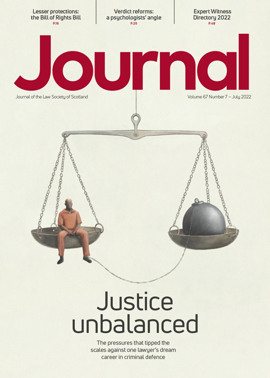Property: Living with the Register of Overseas Entities
It seems that 2022 is becoming the year of the registers. The Register of Overseas Entities (“ROE”) is likely to be introduced imminently, and, unlike the Register of Persons holding a Controlled Interest in Land, this latest register will have a big impact on conveyancing transactions when overseas entities are involved.
The definition of “overseas entity” is wide, encompassing any legal entity (a body corporate, partnership or other entity that is a legal person under the law by which it is governed) that is governed by the law of a country or territory outside the UK.
The ROE will be a UK-wide register, introduced by the Economic Crime (Transparency and Enforcement) Act 2022, and is being fast-tracked for commencement due to the continuing crisis in Ukraine.
Although the ROE will seek to capture details of beneficial owners of affected overseas entities, its principal purpose is to capture details of land located anywhere in the UK held by those entities.
Any overseas entity that either owns or leases land (under a registrable lease) or wants to buy land (or take a registrable lease) in Scotland will need to register in the ROE.
Registration in the ROE
The ROE will be operated by the Registrar of Companies for England & Wales.
There are, in effect, two phases for registration. The first phase – the transitional period – will run for six months from the date of commencement of this part of the 2022 Act.
During that period, any overseas entity that owns or leases land in the UK must register in the ROE. (At the time of writing, the requirement only applies if the land or tenant’s right in the land (i.e. a “relevant interest in land”) has been registered in the Land Register on or after 8 December 2014. There are different cutoff dates for England & Wales, and Northern Ireland.) The overseas entity does not need to be involved in any transaction with that land. Failure to have done so by the end of the transitional period will constitute an offence liable to imprisonment (for every officer of the entity), a fine, or both. The Secretary of State has power to serve notice on an overseas entity at any time, requiring it to register in the ROE.
In addition, any overseas entity that grants a disposition, standard security, lease or assignation of a lease between 28 February 2022 and the date of its registration must provide details of the deed. Even if an overseas entity does not require to register because it has ceased to own land by the end of the transitional period, it must still submit details of deeds granted by it from 28 February.
In theory, therefore, every overseas entity that currently owns or is the registered tenant of land in Scotland any time from 8 December 2014 should be registered in the ROE by the end of the transitional period.
There will, however, be a moratorium on rejection of deeds granted by an unregistered overseas entity (but not on those in favour of one) during the transitional period. There is also an exception for registration of deeds that are in implement of a contract entered into before the later of the date on which the overseas entity’s title was registered and the commencement date.
The second phase applies to overseas entities that acquire or become the registered tenant of land on or after the commencement date. Although the 2022 Act does not impose any express duty on such an overseas entity to register, the effect of its provisions is that, without registration in the ROE, registration in the Land Register is not possible.
A registered overseas entity has a continuing duty to keep its entries in the ROE up to date at least once in every 12-month period, even if there have been no changes to the information previously provided.
Effect of failure to register
If an overseas entity has not registered in the ROE (and is not an exempt entity; regulations have still to be made defining these), the Keeper must:
- reject an application by an overseas entity to register a disposition, lease or assignation (each a “qualifying registrable deed”), and
- reject an application by a person acquiring from an overseas entity to register a qualifying registrable deed or a standard security.
Accordingly, it is going to become an essential component of the conveyancing process, when transacting with an overseas entity, to ensure that (if the overseas entity is not exempt) it is registered in the ROE.
What should the missives say?
If a transaction with an overseas entity to which a contract relates will result in a qualifying registrable deed or a registrable deed that is a standard security, that contract needs to make provision about registration of the overseas entity in the ROE.
Where the overseas entity is the seller, the landlord, or the assignor, or is granting a standard security, the other contracting party requires to be sure that the overseas entity is registered in the ROE, as otherwise the resulting deed will not be capable of being registered, because the Keeper must reject it (unless the overseas entity is exempt). This would mean the purchaser, tenant, assignee or lender, as the case may be, will not get a real right.
Where the overseas entity is the purchaser, the tenant or the assignee, the other contracting party requires to be sure that the overseas entity is registered in the ROE, otherwise the resulting deed will not be capable of being registered, meaning that the seller will not be divested of the title, the landlord will not have an enforceable lease, or the assignor will remain liable as tenant.
Where any party to the missives is an overseas entity, the contract should contain confirmations from them:
- that they are a registered overseas entity;
- that they have complied with the duty (in s 7 of the 2022 Act) to update the ROE; and
- that the information held in the ROE for them is correct, complete and up to date.
Some additional definitions will be required. The PSG offers are being updated to include suitable wording and definitions and will be available on the PSG website as close to commencement as possible, along with a guidance note on conveyancing implications of the ROE.
It is not necessary, in the PSG’s opinion, to require any undertaking from the overseas entity (where it is the seller, landlord or assignor) that it will not remove itself from the ROE until completion of registration of the deed. While an overseas entity can apply to be removed from the ROE, s 10 of the 2022 Act requires the Registrar, on receipt of such an application, to check whether the overseas entity is registered as proprietor, and if it is, the Registrar must refuse to remove it from the ROE.
Neither should it be necessary to require any undertaking from the overseas entity (where it is the purchaser, tenant, or assignee) that it will not withdraw its application for registration in the ROE; or that it will not remove itself from the ROE. Quite apart from the fact that it must be registered in the ROE to be able to register the deed in the Land Register, once registered the overseas entity cannot be removed from the ROE while it is the proprietor or registered tenant of land registered in any of the UK land registers.
Searches
It will be necessary to obtain a search in the ROE. The firms of professional searchers will provide such a search report. The report should disclose that the overseas entity is registered in the ROE; and that the entries in the ROE are up to date.
It is recommended that a search report is obtained at an early stage of the transaction so that if any action is required (such as registration or updating), there will be time to do so before completion. An overseas entity will be able to register in the ROE before it owns or tenants any land, and since the procedures for confirming information and obtaining verification before registration can be effected can take some time, it is recommended that the overseas entity takes steps to register in the ROE at the earliest opportunity.
Perspectives
Features
Briefings
- Civil court: Issues on appeal
- Licensing: Minimum pricing – a genuine impact?
- Insolvency: How to admit joint creditor claims
- Tax: windfall and plastic packaging taxes raise stakes
- Immigration: Asylum system overhauled
- Scottish Solicitors' Discipline Tribunal: July 2022
- In-house: In with the stonework
- Property: Living with the Register of Overseas Entities
In practice
- OPG update: July 2022
- Public policy highlights: July 2022
- Gear up for the Scottish Legal Walks
- Disabled solicitor support group proposed
- Risk: Cybercrime – the hybrid worker prey
- Ask Ash: Piling it on
- TRS: time for a trusts trawl
- Know people, know business
- High street and hybrid
- Appreciation: Ian Leslie Shaw Balfour
- The Expert Witness Directory 2022
- Expert witness: case law update






